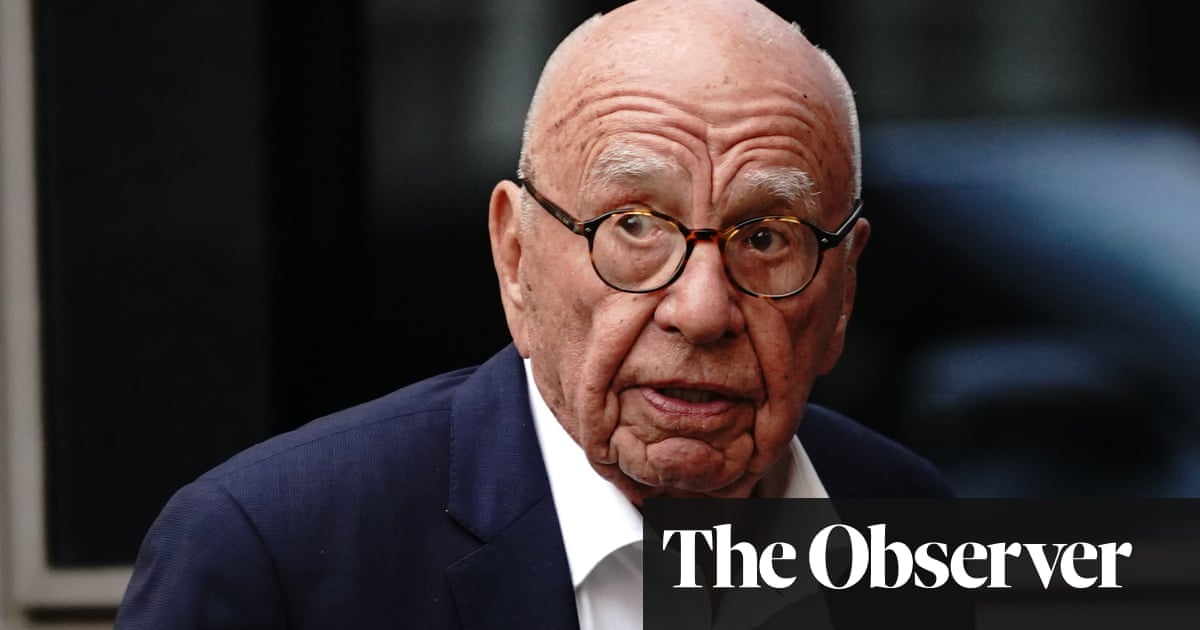- cross-posted to:
- [email protected]
- cross-posted to:
- [email protected]
When some of the mind games and manoeuvres that turned a Murdoch family “retreat” into an ordeal appeared in Succession, the TV drama about squabbling family members of a right-wing media company, members of the real-life family started to suspect each other of leaking details to the writers. The truth was more straightforward. Succession’s creator, Jesse Armstrong, said that his team hadn’t needed inside sources – they had simply read press reports.
Future screenwriters have been gifted a whole load of new Murdoch material in the past few days, after two astonishing stories in the New York Times and the Atlantic lifted the lid on the dysfunction, paranoia and despair at the heart of the most powerful family in global media.
The stories followed the end of the secret trial involving the fate of the Murdoch family trust. The mogul’s four eldest children – Lachlan, James, Elisabeth and Prudence – were set to inherit the family firm following Rupert’s death. But four years ago, just after turning 90, Rupert had tried to cut James, Liz and Prue out of their inheritance and hand the businesses over to Lachlan, his favoured heir who also happens to share his increasingly right-wing politics.
The lawsuit was brought by the three errant offspring, and in December a Nevada commissioner ruled in their favour, accusing Rupert and Lachlan of acting in “bad faith”. The trial took place in secret, but the fallout – thanks to the New York Times investigation and a 13,000-word Atlantic interview with James – has been anything but.



While removal of the fairness Doctrine was a horrible thing. It would not have impacted Fox News in the slightest. It may have had some impact on am talk radio, or Sinclair propaganda. Which would have been a good thing. But zero impact on OANN or similar ilk. Not even CNN or MSNBC or any of the others would have been affected either. It was strictly broadcast only.
I think if it’d stayed, we’d have been talking about applying it to cable, rather than just forgetting it existed in the first place.
There’s certainly no direct link, but I think it indirectly changed the conversation around what society deemed acceptable in news media.
Interesting. Well I stand corrected. I’ve seen people, including in the media and the like, apply it to cable. Can’t help but wonder if some of the misinformation was deliberate and meant to manipulate.
In this case, A I think fairness doctrine should be reinstated and B should apply to more forms of media.
I think a lot of people assume that had it stuck around it would have eventually been applied to cable. But cable was a big new thing at the end of the 1970s early 1980s. Specifically because it didn’t have a lot of the regulation and restrictions that broadcast did.
I think a lot of people would have also assumed that the ERA would have been ratified by now. Or that a woman’s right to abortion would have been enshrined in law by now. But that didn’t happen either. So it’s never good to assume.
And then the real rub, what actually constitutes a Viewpoint worthy of being heard. Yes the fairness Doctrine was supposed to give other viewpoints air time. And it did. But not all of them. Fox News in fact was really good with this formula. Early Fox News often tried to provide the appearance of that sort of balance. Toe-headed Sean Hannity did not have his own show for a long long time. Granted the show was his in all but name. But for a long time he was saddled with a limp wet noodle Democrat. Who was little more than a foil for Sean to stomp over. But Alan Combs did provide some token Democrat views and pushback.
The equal representation was only as good as the honesty and the sincerity of the people behind allowing it. Which was often quite dubious itself.
Great write up. The Fairness Doctrine on its own definitely wouldn’t solve everything. It’d be a step in the right direction, but the journey would be far from over. edit: and there’s probably no “perfect” solution.
I think we would have been better off had it stuck around as well. But I also think that we’ve somewhat arrived at the best of all situations. Where access to Media is much more democratized. You don’t have to rely on a big wealthy owner Etc allowing your Viewpoint to be heard. The modern problem is AI generated fire hoses of disinformation. They can output so much more misinformation through seemingly so many more Outlets than an actual person can. So it’s going to rely on a lot more word of mouth and Trust. People finding good journalists and presenters like coffee Zilla for instance and sharing them with others to help build up trusted networks of Representatives.